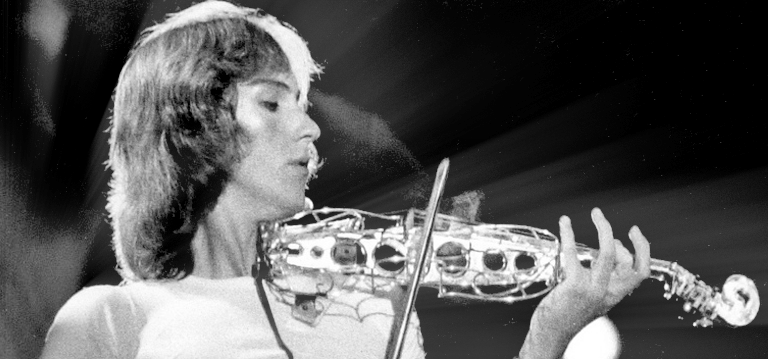The classic rock era’s supporting musicians, those players without whom records would have been very different or not made at all, have always fascinated me from an early age. They might not become household names to anyone outside of the serious rock community, but they gave us so much.
One such fella was Eddie Jobson who I took an early interest in because he was from a place near where I was growing up. So he was ‘one of ours’.There’d be tales, almost certainly apocryphal because he was 7 or 8 years older than us, of lads hearing him practising in his parents house. But it was a chance to vicariously feel like you were involved in the rock world.
Born in Billingham, a couple of miles from my house, Eddie was clearly a bit of a prodigy. He started playing piano early on, and it wasn't long before he was mastering the violin as well. We're talking serious musical chops from a young age, the kind of dedication that makes you think he probably didn't spend much time kicking a football about down the park.
His first proper gig was with Curved Air, leaving the excellently-named Fat Grapple who he joined in 1971. I’m sure I remember seeing their name around the place and in the local paper, the Evening Gazette. They had supported Curved Air and Jobson was very much the flash teenage prodigy. Curved Air were a band with a bit of theatrical flair and a sound that was all their own, blending classical influences with prog rock smarts. Jobson, still young, slotted right in, adding his virtuosic violin playing and increasingly his keyboard wizardry to their complex arrangements to one album, 1973’s Air Cut.
But Eddie wasn't one to stand still. He had a restless musical spirit, always looking for new challenges and musical landscapes to explore. This led him to a pivotal stint with Roxy Music – stepping into the shoes of Brian Eno. That takes some serious confidence and skill. On the Stranded album, Jobson's synthesizers and violin added a new layer of sophistication and sonic texture to Ferry's suave art-rock vision. Tracks like "Mother of Pearl" and "Psalm" bear his unmistakable stamp. He’s also on Viva! The live album, Country Life and Siren.
While in Roxy they supported Zappa and when Roxy came off the treadmill, he joined Zappa’s band and is on the cover of Zoot Allures, though not the record. He is featured prominently on the live album Zappa in New York released in 1978 but recorded in December 1976 at the Palladium. Other albums featuring recordings with Jobson are Studio Tan, Shut Up 'n Play Yer Guitar, You Can't Do That on Stage Anymore, Vol. 6 and the posthumously released Läther, originally slated to be released in 1977. In 2009, Vaulternative Records, Zappa's label, released the live album Philly '76, recorded at the Spectrum Theater in Philadelphia in October 1976, in which Jobson is featured extensively on keyboards and violin.
For many, it's his time with UK that truly cemented his reputation as a progressive rock titan. This was a supergroup in the truest sense, featuring the likes of Bill Bruford, John Wetton, and Allan Holdsworth. The music they created was dense, complex, and utterly breathtaking in its technical brilliance. Jobson's interplay with the other musicians was nothing short of phenomenal, his keyboard and violin lines intertwining and duelling in a dazzling display of musicianship. Their self-titled debut and Danger Money are essential listening, even though they came out in the unsympathetic late 70s and early 80s.
He was asked to participate on Jethro Tull frontman Ian Anderson's solo endeavour, which was eventually released by Chrysalis Records in 1980 as a full-fledged Tull album, A. Jobson, credited as a 'special guest', performed on keyboards, electric violin, and was cited on liner notes as providing additional musical material. He remained with the band for their subsequent world tour in 1980–1981.
Eddie made solo records Zinc – The Green Album and Theme of Secrets and they were groundbreaking, pushing the boundaries of electronic music and demonstrating his mastery of synthesizers and his unique compositional style. He wasn't just playing notes; he was crafting soundscapes, creating immersive sonic experiences.
I always thought that plexi-glass violin was so cool. Now 70 and still recording, though not in any commercial bands, I bet he doesn’t get back to Billingham much.
Sidebar
Unknown outside of the serious rock community...




